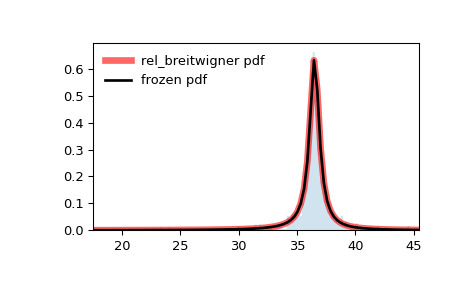本文簡要介紹 python 語言中 scipy.stats.rel_breitwigner 的用法。
用法:
scipy.stats.rel_breitwigner = <scipy.stats._continuous_distns.rel_breitwigner_gen object>#相對論Breit-Wigner 隨機變量。
作為
rv_continuous類的實例,rel_breitwigner對象從它繼承了一組通用方法(完整列表見下文),並用特定於此特定發行版的詳細信息來完成它們。注意:
rel_breitwigner的概率密度函數為其中
相對論Breit-Wigner 分布在高能物理學中用於模擬共振 [1]。它給出了具有特征質量 和 decay-width 的共振的不變質量 [2] 的不確定性,其中 、 和 以自然單位表示。在 SciPy 的參數化中,形狀參數 等於 並采用 中的值。
同樣,相對論Breit-Wigner分布據說給出了center-of-mass能量的不確定性。在自然單位中,光速等於1,不變質量等於靜止能量。在center-of-mass幀中,剩餘能量等於總能量[3]。
上麵的概率密度在“standardized” 表格中定義。要移動和/或縮放分布,請使用
loc和scale參數。具體來說,rel_breitwigner.pdf(x, rho, loc, scale)等同於rel_breitwigner.pdf(y, rho) / scale和y = (x - loc) / scale。請注意,移動分布的位置不會使其成為“noncentral” 分布;某些分布的非中心概括可在單獨的類中獲得。和 是比例參數。例如,如果想要用 和 [4] 建模 玻色子,可以設置
rho=91.1876/2.4952和scale=2.4952。為了確保在使用
fit方法時獲得物理上有意義的結果,應設置floc=0將位置參數固定為 0。參考:
[1]相對論 Breit-Wigner 分布,維基百科,https://en.wikipedia.org/wiki/Relativistic_Breit-Wigner_distribution
[2][3]Center-of-momentum 框架,維基百科,https://en.wikipedia.org/wiki/Center-of-momentum_frame
[4]M.Tanabashi 等人。 (粒子數據組)物理。 Rev. D 98, 030001 - 2018 年 8 月 17 日發布
例子:
>>> import numpy as np >>> from scipy.stats import rel_breitwigner >>> import matplotlib.pyplot as plt >>> fig, ax = plt.subplots(1, 1)計算前四個時刻:
>>> rho = 36.5 >>> mean, var, skew, kurt = rel_breitwigner.stats(rho, moments='mvsk')顯示概率密度函數(
pdf):>>> x = np.linspace(rel_breitwigner.ppf(0.01, rho), ... rel_breitwigner.ppf(0.99, rho), 100) >>> ax.plot(x, rel_breitwigner.pdf(x, rho), ... 'r-', lw=5, alpha=0.6, label='rel_breitwigner pdf')或者,可以調用分布對象(作為函數)來固定形狀、位置和比例參數。這將返回一個 “frozen” RV 對象,其中包含固定的給定參數。
凍結分布並顯示凍結的
pdf:>>> rv = rel_breitwigner(rho) >>> ax.plot(x, rv.pdf(x), 'k-', lw=2, label='frozen pdf')檢查
cdf和ppf的準確性:>>> vals = rel_breitwigner.ppf([0.001, 0.5, 0.999], rho) >>> np.allclose([0.001, 0.5, 0.999], rel_breitwigner.cdf(vals, rho)) True生成隨機數:
>>> r = rel_breitwigner.rvs(rho, size=1000)並比較直方圖:
>>> ax.hist(r, density=True, bins='auto', histtype='stepfilled', alpha=0.2) >>> ax.set_xlim([x[0], x[-1]]) >>> ax.legend(loc='best', frameon=False) >>> plt.show()
相關用法
- Python SciPy stats.relfreq用法及代碼示例
- Python SciPy stats.recipinvgauss用法及代碼示例
- Python SciPy stats.rayleigh用法及代碼示例
- Python SciPy stats.rankdata用法及代碼示例
- Python SciPy stats.rv_histogram用法及代碼示例
- Python SciPy stats.random_table用法及代碼示例
- Python SciPy stats.rvs_ratio_uniforms用法及代碼示例
- Python SciPy stats.rice用法及代碼示例
- Python SciPy stats.random_correlation用法及代碼示例
- Python SciPy stats.ranksums用法及代碼示例
- Python SciPy stats.rv_discrete用法及代碼示例
- Python SciPy stats.randint用法及代碼示例
- Python SciPy stats.rv_continuous用法及代碼示例
- Python SciPy stats.rdist用法及代碼示例
- Python SciPy stats.anderson用法及代碼示例
- Python SciPy stats.iqr用法及代碼示例
- Python SciPy stats.genpareto用法及代碼示例
- Python SciPy stats.skewnorm用法及代碼示例
- Python SciPy stats.cosine用法及代碼示例
- Python SciPy stats.norminvgauss用法及代碼示例
- Python SciPy stats.directional_stats用法及代碼示例
- Python SciPy stats.invwishart用法及代碼示例
- Python SciPy stats.bartlett用法及代碼示例
- Python SciPy stats.levy_stable用法及代碼示例
- Python SciPy stats.page_trend_test用法及代碼示例
注:本文由純淨天空篩選整理自scipy.org大神的英文原創作品 scipy.stats.rel_breitwigner。非經特殊聲明,原始代碼版權歸原作者所有,本譯文未經允許或授權,請勿轉載或複製。
